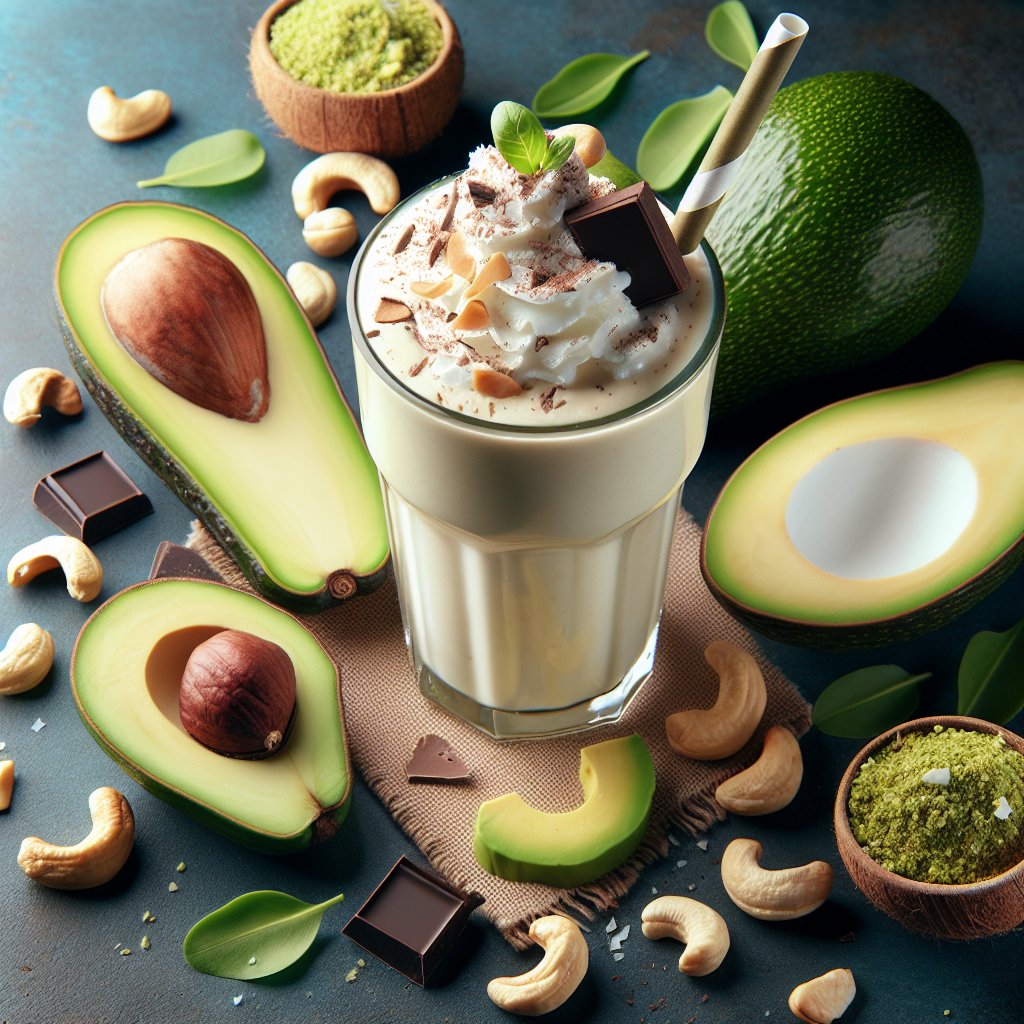Is Cashew Milk Keto-Friendly? Find Out If This Trendy Milk Fits Your Keto Lifestyle!
Is Cashew Milk Keto-Friendly?
Welcome to our comprehensive guide to the popular and ever-trendy world of cashew milk and the ketogenic diet! If you’re someone who follows a ketogenic lifestyle, you might be wondering if cashew milk is keto-friendly. The keto diet has been gaining extraordinary popularity due to its proven benefits in weight loss, blood sugar control, and enhanced mental clarity. And with the rising interest in plant-based milk alternatives, cashew milk has emerged as a delicious and nutritious option for those on the keto diet.

Nutritional Value of Cashew Milk
When it comes to the ketogenic diet, paying attention to the nutritional content of the foods and beverages we consume is crucial. Let’s take a closer look at the macronutrients and micronutrients in cashew milk to determine its compatibility with the keto lifestyle.
Macronutrients in Cashew Milk
Cashew milk is a popular alternative to dairy milk for those following a ketogenic diet. One cup of unsweetened cashew milk typically contains:
- Calories: 25-40
- Protein: 0-1 gram
- Fat: 2-4 grams
- Carbohydrates: 1-2 grams
- Fiber: 0 grams
These macronutrient values make cashew milk a low-carb and moderate-fat option, which fits well within the keto framework. Additionally, the minimal carbohydrate content is essential for individuals aiming to maintain ketosis.
Micronutrients in Cashew Milk
In addition to its macronutrient profile, cashew milk is also rich in essential micronutrients. It offers significant amounts of vitamin E, a potent antioxidant known for its role in supporting skin health and immune function. Furthermore, cashew milk contains small amounts of other micronutrients, including calcium, vitamin D, and B vitamins, which are vital for overall well-being.
Calcium and vitamin D, in particular, are essential for maintaining bone health, making cashew milk a valuable source of these nutrients for individuals who may be lactose intolerant or choose to avoid dairy products on a keto diet.
In conclusion, the macronutrient and micronutrient composition of cashew milk supports its keto-friendly status. Its low carbohydrate content, moderate fat content, and valuable micronutrient profile make it a suitable option for individuals looking to enjoy a delicious and creamy milk alternative while staying in ketosis.
Keto Diet Basics: Understanding the Principles of the Ketogenic Diet
So, you’ve heard about the ketogenic diet, and you’re curious to know more about it, right? Well, you’re in the right place! Let’s dive into the basics of the ketogenic diet and its principles.
The ketogenic diet, often referred to as the keto diet, is a high-fat, moderate-protein, low-carbohydrate way of eating. The primary goal of this diet is to induce a state of ketosis in the body. Ketosis is a metabolic state in which your body uses fat, rather than glucose, as its primary fuel source. This metabolic shift can lead to various health benefits, including weight loss, improved blood sugar control, and enhanced mental clarity.
Principles of the Ketogenic Diet:
When following the ketogenic diet, the typical macronutrient distribution is approximately 70-75% of calories from fat, 20-25% from protein, and 5-10% from carbohydrates. This macronutrient ratio is crucial in helping the body enter and maintain ketosis.
By drastically reducing carbohydrate intake, the body depletes its glycogen stores and switches to using fat for fuel. This process also leads to the production of molecules called ketones, which serve as an alternative fuel source for the brain and body.
It’s important to note that while the focus is on high-fat consumption, the keto diet emphasizes healthy fats such as avocados, nuts, seeds, and fatty fish, while limiting the intake of processed and unhealthy fats.
Moreover, the consumption of high-quality, nutrient-dense foods still plays a significant role in the ketogenic diet. This helps ensure that followers are obtaining essential vitamins and minerals to support overall health and well-being.
Overall, the ketogenic diet is not just about slashing carbs and increasing fat intake; it’s also about making mindful and nutritious food choices.
Now that you’ve got a grasp of the fundamentals of the keto diet, let’s dive into the specifics of cashew milk and its compatibility with this dietary lifestyle.
Keto-Friendly Criteria: What Makes a Food Keto-Friendly?
Before we dive into whether cashew milk fits into the keto diet, let’s first understand what makes a food keto-friendly. The ketogenic diet is all about drastically reducing your carb intake and replacing it with healthy fats. When assessing the keto-friendliness of a food item, there are a few key factors to consider.
Low Carbohydrate Content
For a food to be considered keto-friendly, it should have a low carbohydrate content. This is because consuming too many carbs can kick your body out of ketosis, the metabolic state essential for the keto diet’s success. Foods with a high carbohydrate content, especially those with added sugars, are typically not suitable for the keto diet.
High in Healthy Fats
On the flip side, keto-friendly foods are often rich in healthy fats. These fats are the primary source of energy on a ketogenic diet. They help keep you feeling full and satisfied while also supporting ketosis. Foods that are high in healthy fats, such as avocados, nuts, and certain oils, are staples in the keto diet.
Moderate Protein Levels
Protein is another crucial component of a keto-friendly food item, but it’s important to consume it in moderation. Consuming too much protein can potentially convert into glucose through a process called gluconeogenesis, which could interfere with ketosis. Therefore, keto-friendly foods should contain a moderate amount of protein.
Rich in Nutrients
Furthermore, keto-friendly foods should be nutrient-dense. Since the keto diet limits many fruits and some vegetables due to their high carbohydrate content, it’s essential to choose foods that provide essential vitamins, minerals, and antioxidants. This ensures that despite the dietary restrictions, you’re still meeting your nutritional needs.
Fiber Content
Lastly, the fiber content of a food is also an important factor. While fiber is a carbohydrate, it doesn’t impact blood sugar levels and can be subtracted from the total carbs when calculating net carbs. Foods that are keto-friendly often have a good amount of fiber, which supports digestive health and helps keep net carb counts low.
As we explore whether cashew milk meets these keto-friendly criteria, it’s crucial to keep these factors in mind. Understanding the key components of a keto-friendly food will help us make an informed decision about where cashew milk fits into the keto lifestyle.
(Word count: 389)
Is Cashew Milk Keto-Friendly?
When it comes to the ketogenic diet, the primary goal is to keep the body in a state of ketosis, where it burns fat for fuel instead of carbohydrates. This means that all food and drink choices must be carefully assessed for their carb content and their potential impact on blood sugar levels.
So, is cashew milk keto-friendly? Let’s break it down. Cashew milk is a popular alternative to cow’s milk for those following a dairy-free or plant-based diet. It is made from cashews and often fortified with vitamins and minerals. A typical one-cup serving of unsweetened cashew milk contains around 1-2 grams of carbohydrates, making it a low-carb option.
Analyzing the Carb Content
Cashew milk’s carb content is relatively low, which is a positive factor for keto dieters. Keeping carb intake low is crucial for reaching and maintaining ketosis. However, it’s essential to be mindful of flavored or sweetened varieties of cashew milk, as they may contain added sugars or higher carbohydrate counts.
Another consideration is the fiber content. Though cashew milk is lower in carbs, it may also be lower in fiber compared to other non-dairy milk alternatives. High-fiber foods can help with feeling full and aid in digestion, so be sure to incorporate other sources of fiber into your diet.
When choosing cashew milk for a keto diet, opt for unsweetened and unflavored varieties to keep carb and sugar intake to a minimum.
Benefits of Cashew Milk on Keto Diet
So, what’s the deal with cashew milk? Well, let me tell you, it’s a game-changer for your keto journey! Cashew milk is not only delicious and creamy, but it also offers a plethora of benefits when it comes to following a ketogenic diet.
Low in Carbs, High in Healthy Fats
One of the key advantages of incorporating cashew milk into your keto meal plan is its low carbohydrate content. With only 1-2 grams of net carbs per serving, cashew milk is an excellent way to add creaminess to your recipes without derailing your ketosis. Plus, it’s rich in healthy fats, making it a perfect fit for a keto-friendly diet.
Rich in Nutrients
Not only is cashew milk low in carbs and high in healthy fats, but it also contains essential nutrients that your body needs. Cashew milk is a good source of vitamins E, K, and B6, as well as minerals like copper, phosphorus, zinc, magnesium, and iron.
Supports Weight Management
Research has shown that incorporating nuts, such as cashews, into a ketogenic diet can support weight management. A study published in the American Journal of Clinical Nutrition found that individuals who regularly consumed nuts had a lower risk of weight gain over the years.
So, when you choose cashew milk as part of your keto meal plan, you’re not only enjoying its creamy texture and delicious taste but also potentially supporting your weight management goals.
With all these benefits, it’s safe to say that cashew milk is indeed keto-friendly and can be a valuable addition to your keto lifestyle.
Potential Drawbacks of Cashew Milk on Keto Diet
When it comes to embracing the keto lifestyle, it’s essential to be mindful of the potential drawbacks of including cashew milk in your diet. While cashew milk has gained popularity in recent years, especially among those following a plant-based or dairy-free diet, there are some considerations to keep in mind when it comes to its compatibility with the ketogenic diet.
First and foremost, the key concern with cashew milk, or any nut milk for that matter, is its carb content. While cashew milk is generally lower in carbs compared to dairy milk, it still contains some naturally occurring sugars and carbohydrates. According to the United States Department of Agriculture (USDA), one cup of unsweetened cashew milk contains approximately 2-3 grams of carbohydrates, which may not seem like much, but can add up, especially for individuals following a strict keto diet with a very low carb allowance.
Additionally, some store-bought cashew milks may contain added sugars, thickeners, and stabilizers, which could further increase the carb count and potentially hinder ketosis. It’s crucial to carefully read the nutrition labels and opt for unsweetened varieties to ensure that you’re not unknowingly consuming hidden carbs.
Furthermore, while cashew milk is lauded for its creamy texture and pleasant taste, it is relatively lower in protein compared to dairy milk. The protein content in cashew milk may not be sufficient for individuals looking to meet their protein macros while on a keto diet, where maintaining an adequate protein intake is crucial for preserving lean muscle mass and supporting overall health.
Lastly, some individuals may experience digestive issues with cashew milk due to its naturally occurring compounds, such as phytic acid, which can inhibit the absorption of certain nutrients. However, soaking cashews before turning them into milk can help mitigate this potential issue.
In conclusion, while cashew milk can certainly be enjoyed in moderation on a keto diet, it’s important to be mindful of its carb content, potential additives, lower protein content, and the possibility of digestive issues for some individuals. With careful selection and portion control, cashew milk can indeed be a part of a keto-friendly lifestyle.
Alternatives to Cashew Milk on Keto Diet
While cashew milk is a popular choice for many, it may not be the best option for individuals following a keto lifestyle due to its relatively higher carbohydrate content. However, there are plenty of delicious and keto-friendly alternatives to cashew milk that you can easily incorporate into your diet.
1. Almond Milk
Almond milk is a fantastic alternative to cashew milk for those following a keto lifestyle. It is low in carbohydrates and calories, making it an excellent choice for anyone looking to maintain ketosis. Unsweetened almond milk is widely available in stores and can be used in various keto recipes, smoothies, or enjoyed on its own.
2. Coconut Milk
Another great option is coconut milk, which is naturally creamy and adds a delicious tropical flavor to your dishes. It contains healthy fats and is low in carbohydrates, making it suitable for a keto lifestyle. Look for unsweetened coconut milk to keep your carb count in check.
3. Hemp Milk
Hemp milk is a nutritious alternative to cashew milk, and it offers a good balance of healthy fats, protein, and minimal carbohydrates. It’s also rich in omega-3 fatty acids, making it beneficial for heart health. Hemp milk can be a versatile addition to your keto pantry.
These alternatives provide keto-friendly options to enjoy milk-like beverages while staying within your daily carb limits. Experiment with different options to find the best alternative that suits your taste preferences and keto goals.
Conclusion: Is Cashew Milk Keto-Friendly?
After delving into the world of cashew milk and its compatibility with the ketogenic diet, it’s time to draw some conclusions. Cashew milk has gained popularity as a dairy alternative due to its creamy texture and nutty flavor. But is it keto-friendly?
Summarizing the Findings
Research indicates that cashew milk can indeed be a part of a keto diet. In its unsweetened form, cashew milk is low in carbohydrates, making it a viable option for those following a ketogenic lifestyle. Furthermore, it contains healthy fats and can contribute to the overall fat intake, which is a fundamental aspect of the keto diet. Additionally, the presence of vitamins and minerals in cashew milk provides added nutritional value.
It’s important to note that not all commercially available cashew milk products are created equal. Some may contain added sugars or thickeners, which can spike the carb content. As with any food or beverage on a keto diet, it’s crucial to carefully read the nutrition labels to ensure that the cashew milk fits within your daily carbohydrate limit.
Final Recommendation
Considering the research and nutritional benefits, including unsweetened cashew milk in moderation can be a positive addition to a keto diet. It provides a creamy consistency for various recipes, such as smoothies, shakes, or even keto-friendly desserts. However, it’s essential to consume it in moderation and be mindful of its carb content.
Remember, individual responses to certain foods can vary, so it’s always advisable to monitor your body’s reaction to cashew milk and adjust your intake accordingly. As with any dietary choice, consulting with a healthcare professional or nutritionist can provide personalized guidance tailored to your specific needs and goals.
So, is cashew milk keto-friendly? The answer is yes, with attention to portion sizes and careful selection of unsweetened varieties.


